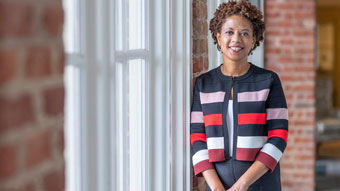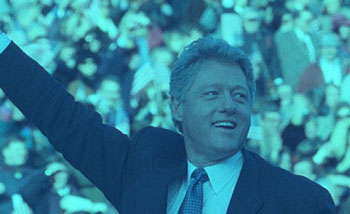‘Was Monica Lewinsky going to testify?’
Senate staffer Melody Barnes remembers the elephant in the room during the Clinton impeachment trial

Melody Barnes is co-director of the University of Virginia's Democracy Initiative, a professor of practice at UVA's Miller Center, and a distinguished fellow at the UVA School of Law. She was chief counsel to the late Senator Edward M. Kennedy on the Senate Judiciary Committee and had a front-row seat to the Clinton impeachment hearings. Here is an excerpt from her Miller Center oral history.
Q: We skipped over the whole Clinton impeachment, which I know you were very actively involved in. If you could walk us through that, your role, and also what you observed of Senator Kennedy’s role during the Clinton near-impeachment.
Barnes: It was kind of this surreal experience of watching the House vote to impeach. There was a point at which all of a sudden I realized, Oh, coming to a theater near you. This was really going to be on our doorstep, and the Senate was going to have to deal with it and the House wasn’t going to stop itself. I don’t remember that Senator Kennedy and I were talking about it that much initially, as the House started to move, and then the holidays came up, but after a while it was quite clear that we were going to have to deal with it.
The big question for the Senate, and I think for virtually all of them, was: How does the Senate get out of this not looking like the House? I think the institution itself was really important to the vast majority, if not all of them. The question was: How do we proceed? People were looking at history and reading the history, but there were no clear guideposts there.
There was a meeting that was to take place in the old Senate Chamber in the Capitol, which is tiny and could just hold the 100 Senators and the leadership staff, Senate Legal Counsel, and without cameras. So they went into that meeting and our chief of staff said to me, “Oh, can you just go down and meet him afterward and see if he needs anything? There might be press outside or whatever.” I said sure.
I ran down there and I remember the door opened and Senators started to come out, and I could just hear little snippets of conversation, and I’d heard them—Teddy waxing on about Daniel Webster. What in the world happened in there? Just these pieces of conversation, and then he comes out and he’s walking really, really fast. We’d always laugh about how much faster he could walk than I could. He kind of grabbed my elbow and we were going somewhere. I had no idea where we were going, and I felt like my feet weren’t even touching the ground, and he’s whispering to me. I wondered, What happened?
I heard bits and pieces and bits and pieces, and we ended up, I think, in Senator [Phil] Gramm’s office. We were in one of the Republican leader’s offices, not very large, and there we are around this big, round table. It’s Senator Kennedy, Senator Gramm, I think Senator [Trent] Lott, and a few staffers, Senate Legal Counsel, who I knew.
We’re sitting there and I’m still trying to figure out what’s going on, and as the conversation unfolds, it was becoming clear that Senator Kennedy and Senator Gramm, in that meeting in the Old Senate Chamber, had started articulating the framework for an agreement that would allow the Senate to proceed, and we were there to try and hammer it out and to try and figure out how to get it done. So he talked to me a little bit more after that meeting was over, and he asked me if I knew what we needed to do.
We spent the day going back and forth, in and out of these meetings and then up in the Senator’s hideaway office in the Capitol. We brought in a few of my Judiciary colleagues and his legislative director, Carey Parker, and we talked through what was going on, went back into negotiations, and came out. And then ultimately—I don’t think I’m making this up. I think I remember Senator Kennedy and Senator Lott maybe shaking hands, as if to say, “We’ve got it.” It was all put together and we all read it, and they wanted to vote that evening.
We left his hideaway and walked back downstairs so he could go to the floor and we could go sit in the staff area. I’ll never forget; I have never seen that much press in my life. They were just lined up and they kept asking him questions. I think he was really proud of working with Gramm—not your likely alliance—to hammer out something that would allow them to move forward because they had to, but to do it in a way that would protect the institution.
Q: So the concern was, in part, the kind of testimony that would have to take place on the Senate floor? Was that—that it would be so—
Barnes: One of the big issues: Was Monica Lewinsky going to testify, and were others going to have to testify? I think that was the big pink elephant in the room. With all the concern about that and all the bomb throwing that had happened in the House, how do we start this process? They knew they had to do it, but everyone was really concerned about the outcome. They developed an agreement that would allow the process to get started and to move forward, and a way for the Senate to try and figure out how to deal with that.
I know for a fact, because I heard it from some of my staff colleagues, not everyone was thrilled with the agreement—some thought things could have been done better—but I think in reality, the clock was ticking, it had to be done, and we weren’t going to end up with a perfect agreement because it was a matter of compromise.
Q: Do you know if the Clinton White House was pleased? We’ve heard—well, go ahead.
Barnes: It would be interesting to hear what you heard, because I don’t remember hearing that, and it may be that I’ve blanked it out, but I honestly just don’t remember.
Q: I think initially they were not pleased.
Barnes: That very well could be true.
Q: Do you know if the Senator was in contact with the President? Do you have any sense of that at all?
Barnes: I don’t think he was. I think I remember that he was talking to some other really smart lawyers, former Kennedy staff, and not a plethora, maybe a couple of people. I think that was happening, but my memory is a little hazy on that.
Q: Was Vicki [Reggie Kennedy] involved at all in any of this? Excuse me, Vicki Kennedy, Mrs. Kennedy.
Barnes: Yes. Vicki was there at the end of that day when we were in the hideaway. During the trial, she would come to parts of the trial, and we were based in his hideaway office in the Capitol. It was just easier to meet with him, because he’d just come up from the floor. So she was there, and if we were having a conversation about it—during every break, the press was right there, so he’d come up, we’d talk to him about what had just happened, he’d go out and talk to the press, some national, all Massachusetts. We were in conversation then and she was, I think, a part of those conversations. And in other instances, particularly when we were briefing him at the house, she would often participate in the briefings, and it was very helpful. She’s a good lawyer. She understands him, obviously, and the way he thinks. So there was a lot that she could bring to the table as well.
. . .
Q: Anything else from the impeachment, the actual trial itself, or—
Barnes: No. I remember it was kind of on autopilot after that. It proceeded. We all knew what the outcome was going to be, and we just kind of went forward with it.
Q: There was never any doubt about the outcome?
Barnes: No. I never remember having that feeling at all.

